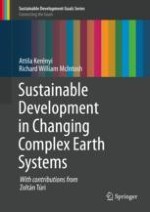2020 | OriginalPaper | Chapter
6. Steps Towards Realising Global Sustainable Development
Authors : Attila Kerényi, Richard William McIntosh
Published in: Sustainable Development in Changing Complex Earth Systems
Publisher: Springer International Publishing
Activate our intelligent search to find suitable subject content or patents.
Select sections of text to find matching patents with Artificial Intelligence. powered by
Select sections of text to find additional relevant content using AI-assisted search. powered by
